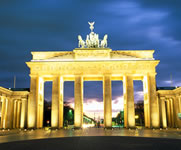Other highlights
Contact
Tourismus & Congress GmbH Frankfurt am Main
Kaiserstrasse 56
60328 Frankfurt
Email:
[email protected]
Internet:
www.frankfurt-tourismus.de
Kaiserstrasse 56
60328 Frankfurt
Email:
[email protected]
Internet:
www.frankfurt-tourismus.de
Contact
Ausstellungs- und Messe-Ausschuss der Deutschen Wirtschaft e.V. (AUMA)
Littenstraße 9
10179 Berlin
Email:
[email protected]
Internet:
www.auma-messen.de
Littenstraße 9
10179 Berlin
Email:
[email protected]
Internet:
www.auma-messen.de
Places of interest

The best view of Germany's foremost financial centre and its unique skyline can be gained from the banks of the river Main. The viewing platform 200 metres up the Maintower affords great views over the city and the river Main as far as the Taunus hills. There are also restaurants and bars at lofty heights.
The old city centre with its magnificent half-timbered buildings was rebuilt in 1986 based on historical plans. Frankfurt's first bank was established in the 17th century in a building on the corner of Römerberg square, known as the "Grosser Engel“ (Great Angel). Three former patrician town houses dating back to the 14th century form the striking Gothic triple-gabled facade of the Römer town hall - Frankfurt's famous landmark. The historical town hall is still the Frankfurt mayoral residence.
St. Paul's Church built between 1789 and 1833, is the original national symbol for freedom and democracy in Germany. In 1848 the church was the seat of the first German national assembly, whose proposals formed the basis of Germany's present constitution, the Grundgesetz. Since its reconstruction after the second world war, St. Paul's is no longer used as a church, but concentrates on its role as the "cradle of German democracy". It hosts prize ceremonies and various other political and cultural events.
Travel Planner
Select an option...
Map of Germany
Hotels in Frankfurt
Loading



